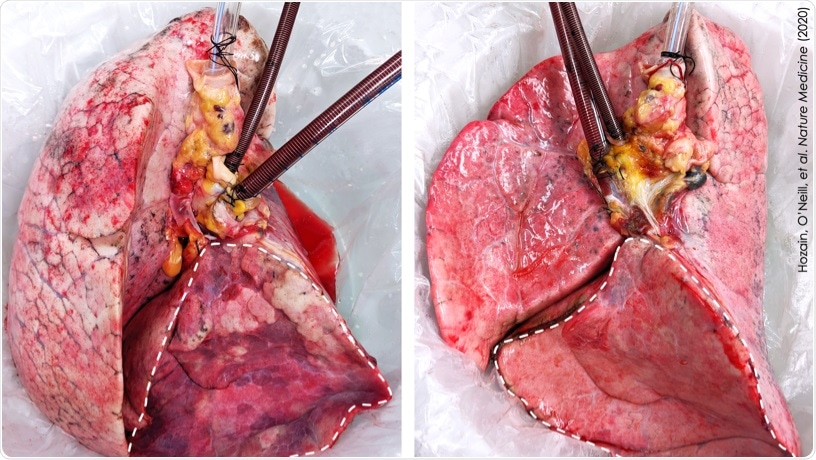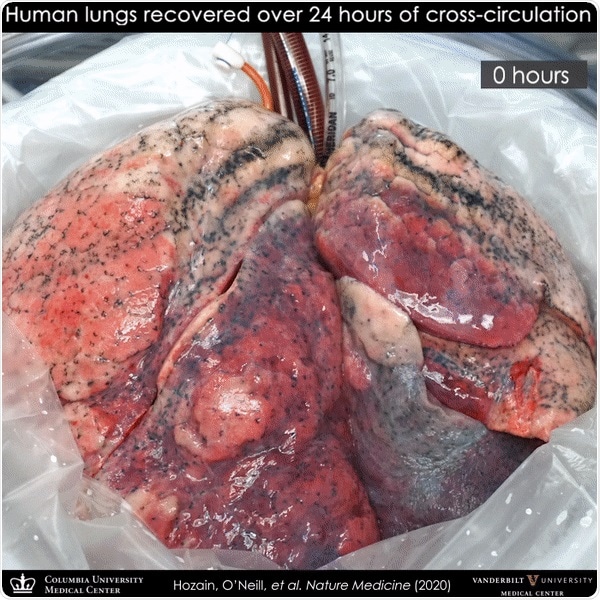The reality of terminal lung disease is that there are more patients badly needing a lung transplant than there are donors available. The reason behind this is not just tied to a low number of donors, but many lungs donated are markedly damaged, making them unusable.
In some instances, donated lungs are too damaged to be used in transplants. But, a new experiment by researchers at the Columbia Engineering and Vanderbilt University may have the solution to this long-standing problem. The team revived and repaired the damaged lungs by cross-circulation support of the whole lungs outside the body using the circulatory system with that of a living pig.

Human lung that failed on EVLP (left) and then recovered on cross-circulation (right).
Lung transplant
Many people with severe lung disease may need a transplant to survive. Among the most common diseases that may render the patient to be in dire need of a lung transplant include chronic obstructive pulmonary disease (COPD), cystic fibrosis, bronchiectasis, sarcoidosis, pulmonary hypertension, bronchoalveolar carcinoma, heart disease that affected the lungs, and pulmonary fibrosis, among others.
Lung transplant is indicated for patients with end-stage lung disease who have tried all possible therapies to no avail. It is also recommended for patients with lung disease that has no available medical therapy.
According to the NHS, lung transplants are not performed regularly in the United Kingdom due to the lack of available donors. In fact, between 2017 and 2018, there were 214 lung transplants done in the country.
In the United States, the most commonly transplanted organs are the kidney, liver, heart, lungs, pancreas, and intestines. There are around 75,000 people in the active waiting list for organs, but only about 8,000 deceased organ donors each year. An organ donor provides at least 3.5 organs while living donors provide about 6,000 organs each year.
One of the problems faced by doctors and patients amid the need for a lung transplant is that donated lungs are too damaged to be used. As soon as a person dies, the lungs begin to deteriorate. If the person who died is an organ donor, one of the most important things is to get the lungs to a recipient as soon as possible. The lungs are very fragile and delicate, making it one of the hardest organs to preserve.
Alternative way
Lung disease is the third leading cause of death across the globe, and most often, lung transplant is the only cure for patients who have end-stage lung disease. Despite advances in the medical field, lung transplantation remains limited due to the lungs donated, incurring severe but potentially reversible injuries.
Published in the journal Nature Medicine, the researchers, led by Matthew Bacchetta of Vanderbilt University and Gordana Vunjak-Novakovic of Columbia University, experimented by connecting each of five human lungs declined as too damaged to be transplanted to a pig, sharing the animal's kidney, liver, and other functions. With the new experimental technique, the damaged lung has been restored to function, providing intrinsic biological repair mechanisms for hours, long enough to help recover severely damaged lungs that cannot otherwise be saved.
In the new technique, the lung's temperature is maintained, and a bloodless solution containing oxygen, proteins, and nutrients is circulated through it.

Video showing the sequence of lung recovery on cross-circulation system.
Study findings
The team worked on the new technique over the past eight years. They developed a new method to provide lungs for patients who badly need organ transplants. In 2017, the team showed the potential of cross-circulation support of the whole lungs outside the human body. Two years after, they showed the effectiveness of cross-circulation by regenerating severely damaged swine lungs. The team was also able to extend the duration of cross-circulation support to an unprecedented four days.
The team also demonstrated that lungs declined for transplantation can be recovered after 24 hours of cross-circulation.
"We were able to recover a donor lung that failed to recover on the clinical ex vivo lung perfusion system, which is the current standard of care. This was the most rigorous validation of our cross-circulation platform to date, showing great promise for its clinical utility," Vunjak-Novakovic said.
The team believes that their work is promising but needs more research before cross-circulation can become a clinical reality. They hope that the technique can be used to save damaged lungs and help patients with end-stage lung disease to have a second shot in life.
Sources:
Journal reference: